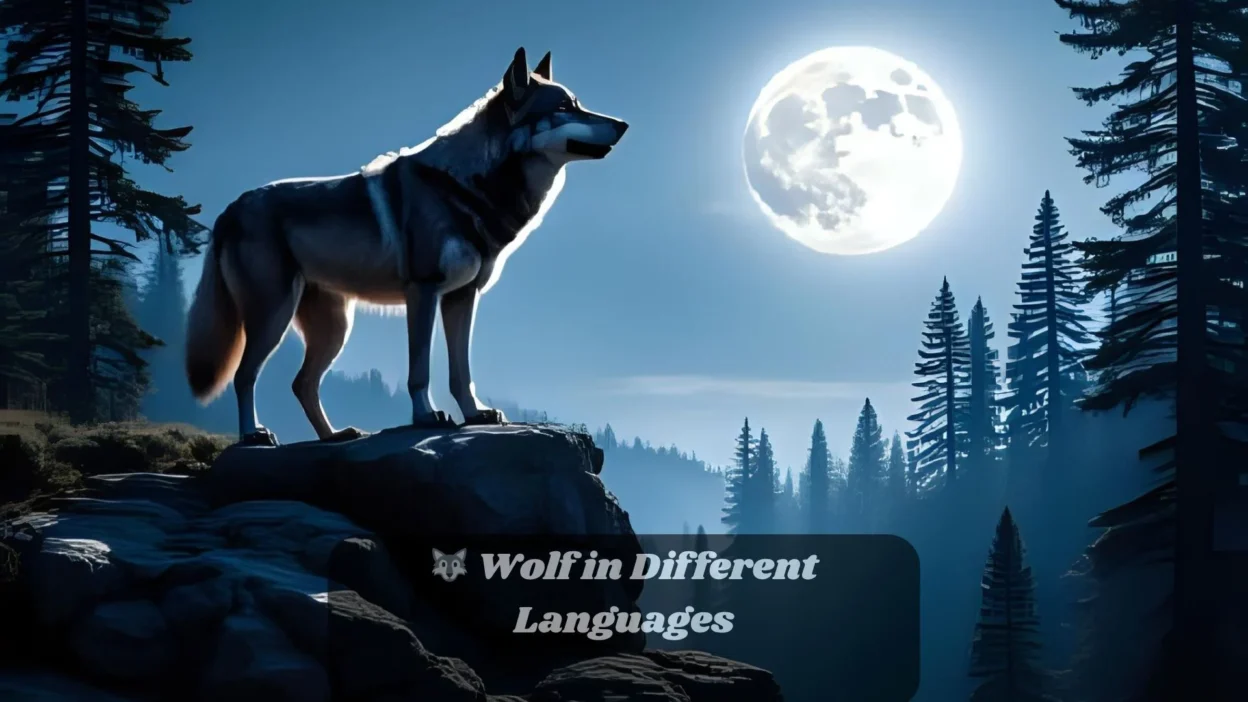When people search for the word “wolf” in different languages, they’re usually driven by curiosity, cultural interest, or language learning.
Whether you’re writing a story, traveling, naming a pet, or just intrigued by how languages express the same creature differently, this post is here to help.
This article gives you the translation of “wolf” in 70 different languages, complete with easy-to-understand pronunciation and example sentences. You’ll not only know how to say wolf but also how to use it in real conversations.
🌐 How to Say Wolf in 70 Different Languages
- Spanish (🇪🇸) – Lobo | Pronunciation: LO-bo
El lobo aúlla por la noche. (The wolf howls at night.) - French (🇫🇷) – Loup | Pronunciation: loo
Le loup est un animal sauvage. (The wolf is a wild animal.) - German (🇩🇪) – Wolf | Pronunciation: vohlf
Der Wolf lebt im Wald. (The wolf lives in the forest.) - Italian (🇮🇹) – Lupo | Pronunciation: LOO-poh
Il lupo corre veloce. (The wolf runs fast.) - Portuguese (🇵🇹) – Lobo | Pronunciation: LO-bo
O lobo está na floresta. (The wolf is in the forest.) - Russian (🇷🇺) – Волк (Volk) | Pronunciation: vohlk
Волк воет на луну. (The wolf howls at the moon.) - Chinese (🇨🇳) – 狼 (Láng) | Pronunciation: lahng
那只狼在山上。 (That wolf is on the mountain.) - Japanese (🇯🇵) – 狼 (Ōkami) | Pronunciation: oh-kah-mee
狼は夜に吠える。 (The wolf howls at night.) - Korean (🇰🇷) – 늑대 (Neukdae) | Pronunciation: nuk-day
늑대가 숲에 살고 있어요. (The wolf lives in the forest.) - Arabic (🇸🇦) – ذئب (Dhi’b) | Pronunciation: zeeb
الذئب يركض في الجبال. (The wolf runs in the mountains.) - Hindi (🇮🇳) – भेड़िया (Bhediya) | Pronunciation: bheh-dee-yah
भेड़िया जंगल में रहता है। (The wolf lives in the forest.) - Bengali (🇧🇩) – নেকড়ে (Nekre) | Pronunciation: nek-rey
নেকড়ে ডাকে রাতে। (The wolf howls at night.) - Urdu (🇵🇰) – بھیڑیا (Bheriya) | Pronunciation: bheh-ree-ya
بھیڑیا جنگل میں ہے۔ (The wolf is in the jungle.) - Turkish (🇹🇷) – Kurt | Pronunciation: koort
Kurt ormanda yaşıyor. (The wolf lives in the forest.) - Greek (🇬🇷) – Λύκος (Lýkos) | Pronunciation: LEE-kos
Ο λύκος ουρλιάζει. (The wolf howls.) - Hebrew (🇮🇱) – זאב (Ze’ev) | Pronunciation: zeh-EV
הזאב נמצא ביער. (The wolf is in the forest.) - Polish (🇵🇱) – Wilk | Pronunciation: veelk
Wilk wyje do księżyca. (The wolf howls at the moon.) - Romanian (🇷🇴) – Lup | Pronunciation: loop
Lupul este un animal sălbatic. (The wolf is a wild animal.) - Dutch (🇳🇱) – Wolf | Pronunciation: volf
De wolf is terug in Nederland. (The wolf is back in the Netherlands.) - Swedish (🇸🇪) – Varg | Pronunciation: varg
Vargen ylar på natten. (The wolf howls at night.) - Finnish (🇫🇮) – Susi | Pronunciation: soo-see
Susi elää metsässä. (The wolf lives in the forest.) - Norwegian (🇳🇴) – Ulv | Pronunciation: oolv
Ulven løper i skogen. (The wolf runs in the forest.) - Danish (🇩🇰) – Ulv | Pronunciation: oolv
Ulven hyler mod månen. (The wolf howls at the moon.) - Czech (🇨🇿) – Vlk | Pronunciation: vlk
Vlk žije v lese. (The wolf lives in the forest.) - Hungarian (🇭🇺) – Farkas | Pronunciation: far-kahsh
A farkas az erdőben él. (The wolf lives in the forest.) - Ukrainian (🇺🇦) – Вовк (Vovk) | Pronunciation: vohvk
Вовк виє на місяць. (The wolf howls at the moon.) - Slovak (🇸🇰) – Vlk | Pronunciation: vlk
Vlk sa túla lesom. (The wolf roams the forest.) - Serbian (🇷🇸) – Вук (Vuk) | Pronunciation: vook
Вук живи у шуми. (The wolf lives in the forest.) - Croatian (🇭🇷) – Vuk | Pronunciation: vook
Vuk luta šumom. (The wolf wanders through the forest.) - Bosnian (🇧🇦) – Vuk | Pronunciation: vook
Vuk je noćna životinja. (The wolf is a nocturnal animal.) - Bulgarian (🇧🇬) – Вълк (Vǎlk) | Pronunciation: vuhlk
Вълкът вие през нощта. (The wolf howls at night.) - Albanian (🇦🇱) – Ujku | Pronunciation: OO-ykoo
Ujku është i egër. (The wolf is wild.) - Macedonian (🇲🇰) – Волк (Volk) | Pronunciation: vohlk
Волкот е во шумата. (The wolf is in the forest.) - Georgian (🇬🇪) – მგელი (Mgeli) | Pronunciation: muh-GEH-lee
მგელი ტყეშია. (The wolf is in the woods.) - Armenian (🇦🇲) – Գայլ (Gayl) | Pronunciation: guy-l
Գայլը գիշերում է ճառագայթում։ (The wolf howls at night.) - Persian (🇮🇷) – گرگ (Gorg) | Pronunciation: gorg
گرگ در کوهها زندگی میکند. (The wolf lives in the mountains.) - Pashto (🇦🇫) – لېوه (Lewa) | Pronunciation: lay-wah
لږه د ځنګل نه راوتلی. (The wolf came from the forest.) - Kurdish (🇮🇶) – Gur | Pronunciation: goor
Gur li daristanê dijî. (The wolf lives in the forest.) - Sindhi (🇵🇰) – ٻلي (Bili) | Pronunciation: bih-lee
ٻلي رات جو شڪار ڪري ٿو. (The wolf hunts at night.) - Punjabi (🇮🇳) – ਭੇੜੀਆ (Bhediya) | Pronunciation: bheh-dee-ya
ਭੇੜੀਆ ਰਾਤ ਨੂੰ ਚੀਕ ਮਾਰਦਾ ਹੈ। (The wolf howls at night.)
- Swahili (🇰🇪) – Mbwa mwitu | Pronunciation: m-bwa mwee-too
Mbwa mwitu anaishi porini. (The wolf lives in the wild.) - Zulu (🇿🇦) – Impisi | Pronunciation: eem-PEE-see
Impisi iphila ehlathini. (The wolf lives in the forest.) - Xhosa (🇿🇦) – Inja yasendle | Pronunciation: een-jah yah-send-leh
Inja yasendle iyakhala ebusuku. (The wolf howls at night.) - Amharic (🇪🇹) – ተኩላ (Tekula) | Pronunciation: teh-KOO-lah
ተኩላው በጫካ ይኖራል። (The wolf lives in the forest.) - Somali (🇸🇴) – Waraabe | Pronunciation: wah-RAH-beh
Waraabuhu wuu ooya habeenkii. (The wolf howls at night.) - Yoruba (🇳🇬) – Ikooko | Pronunciation: ee-KOH-koh
Ikooko wa ninu igbó. (The wolf is in the forest.) - Hausa (🇳🇬) – Kura | Pronunciation: KOO-rah
Kura tana cikin daji. (The wolf is in the jungle.) - Igbo (🇳🇬) – Agu ọhịa | Pronunciation: ah-go oh-hyah
Agu ọhịa nọ n’ime ọhịa. (The wolf is in the forest.) - Thai (🇹🇭) – หมาป่า (Măa-pàa) | Pronunciation: mah-pah
หมาป่าอาศัยอยู่ในป่า (The wolf lives in the forest.) - Vietnamese (🇻🇳) – Sói | Pronunciation: soy
Sói sống trong rừng. (The wolf lives in the forest.) - Indonesian (🇮🇩) – Serigala | Pronunciation: seh-ree-GAH-lah
Serigala itu melolong. (The wolf is howling.) - Malay (🇲🇾) – Serigala | Pronunciation: seh-ree-GAH-lah
Serigala tinggal di hutan. (The wolf lives in the forest.) - Tagalog (🇵🇭) – Lobo | Pronunciation: LO-boh
Ang lobo ay nasa kagubatan. (The wolf is in the forest.) - Lao (🇱🇦) – ຄົນປ່າ (Khon Pa) | Pronunciation: khon pah
ຄົນປ່າຢູ່ໃນປ່າ. (The wolf is in the forest.) - Khmer (🇰🇭) – ចចក (Chachak) | Pronunciation: cha-chok
ចចករស់នៅក្នុងព្រៃ។ (The wolf lives in the jungle.) - Mongolian (🇲🇳) – Чоно (Chono) | Pronunciation: choh-noh
Чоно ойд амьдардаг. (The wolf lives in the forest.) - Tibetan (🇨🇳) – སེར་སྟོད (Serdoe) | Pronunciation: ser-doe
སེར་སྟོད་ནང་ནས་སྐད་བཏང་བས། (The wolf howled.) - Nepali (🇳🇵) – ब्वाँसो (Bwan-so) | Pronunciation: bwan-soh
ब्वाँसो जंगलमा बस्छ। (The wolf lives in the jungle.) - Sinhala (🇱🇰) – වළලු (Walalu) | Pronunciation: wah-lah-loo
වළලු වනයේ ජීවත්වේ. (The wolf lives in the forest.) - Maori (🇳🇿) – Wuruwhi | Pronunciation: woo-roo-fee
Kei te ngahere te wuruwhi. (The wolf is in the forest.) - Hawaiian (🇺🇸) – ʻĪlio hihiu | Pronunciation: ee-lee-oh hee-hee-oo
ʻO ka ʻīlio hihiu i ka nahele. (The wolf is in the forest.) - Samoan (🇼🇸) – Luko | Pronunciation: loo-koh
O le luko e nonofo i le vao. (The wolf lives in the wild.) - Tongan (🇹🇴) – Luko | Pronunciation: loo-koh
ʻOku nofo ʻa e luko ʻi he ngoue. (The wolf lives in the forest.) - Fijian (🇫🇯) – Lobo | Pronunciation: loh-boh
Na lobo e tiko ena veikau. (The wolf is in the forest.) - Esperanto (🌍) – Lupo | Pronunciation: loo-poh
La lupo loĝas en la arbaro. (The wolf lives in the forest.) - Icelandic (🇮🇸) – Úlfur | Pronunciation: ool-vur
Úlfurinn býr í skóginum. (The wolf lives in the forest.) - Irish (🇮🇪) – Mac tíre | Pronunciation: mock teer-eh
Tá an mac tíre sa choill. (The wolf is in the woods.) - Scottish Gaelic (🏴) – Madadh-allaidh | Pronunciation: mah-dah ah-lee
Tha am madadh-allaidh anns a’ choille. (The wolf is in the forest.) - Welsh (🏴) – Blaidd | Pronunciation: blithe
Mae’r blaidd yn udo. (The wolf is howling.) - Basque (🇪🇸) – Otso | Pronunciation: ot-soh
Otsoa basoan bizi da. (The wolf lives in the forest.)
🌟 Conclusion:
No matter where you go in the world, the word “wolf” always carries a sense of wild beauty and strength.




